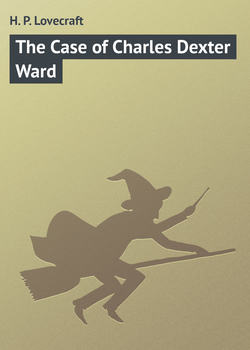The Case of Charles Dexter Ward

Реклама. ООО «ЛитРес», ИНН: 7719571260.
Оглавление
H. P. Lovecraft. The Case of Charles Dexter Ward
Introduction
I. A Result and a Prologue
II. An Antecedent and a Horror
III. A Search and an Evocation
IV. A Mutation and a Madness
V. A Nightmare and a Cataclysm
Отрывок из книги
From a private hospital for the insane near Providence, Rhode Island, there recently disappeared an exceedingly singular person. He bore the name of Charles Dexter Ward, and was placed under restraint most reluctantly by the grieving father who had watched his aberration grow from a mere eccentricity to a dark mania involving both a possibility of murderous tendencies and a profound and peculiar change in the apparent contents of his mind. Doctors confess themselves quite baffled by his case, since it presented oddities of a general physiological as well as psychological character.
In the first place, the patient seemed oddly older than his twenty-six years would warrant. Mental disturbance, it is true, will age one rapidly; but the face of this young man had taken on a subtle cast which only the very aged normally acquire. In the second place, his organic processes shewed a certain queerness of proportion which nothing in medical experience can parallel. Respiration and heart action had a baffling lack of symmetry; the voice was lost, so that no sounds above a whisper were possible; digestion was incredibly prolonged and minimised, and neural reactions to standard stimuli bore no relation at all to anything heretofore recorded, either normal or pathological. The skin had a morbid chill and dryness, and the cellular structure of the tissue seemed exaggeratedly coarse and loosely knit. Even a large olive birthmark on the right hip had disappeared, whilst there had formed on the chest a very peculiar mole or blackish spot of which no trace existed before. In general, all physicians agree that in Ward the processes of metabolism had become retarded to a degree beyond precedent.
.....
It was at once clear to Charles Ward that he had indeed discovered a hitherto unknown great-great-great-grandfather. The discovery doubly excited him because he had already heard vague reports and seen scattered allusions relating to this person; about whom there remained so few publicly available records, aside from those becoming public only in modern times, that it almost seemed as if a conspiracy had existed to blot him from memory. What did appear, moreover, was of such a singular and provocative nature that one could not fail to imagine curiously what it was that the colonial recorders were so anxious to conceal and forget; or to suspect that the deletion had reasons all too valid.
Before this, Ward had been content to let his romancing about old Joseph Curwen remain in the idle stage; but having discovered his own relationship to this apparently “hushed-up” character, he proceeded to hunt out as systematically as possible whatever he might find concerning him. In this excited quest he eventually succeeded beyond his highest expectations; for old letters, diaries, and sheaves of unpublished memoirs in cobwebbed Providence garrets and elsewhere yielded many illuminating passages which their writers had not thought it worth their while to destroy. One important sidelight came from a point as remote as New York, where some Rhode Island colonial correspondence was stored in the Museum at Fraunces’ Tavern. The really crucial thing, though, and what in Dr. Willett’s opinion formed the definite source of Ward’s undoing, was the matter found in August 1919 behind the panelling of the crumbling house in Olney Court. It was that, beyond a doubt, which opened up those black vistas whose end was deeper than the pit.
.....